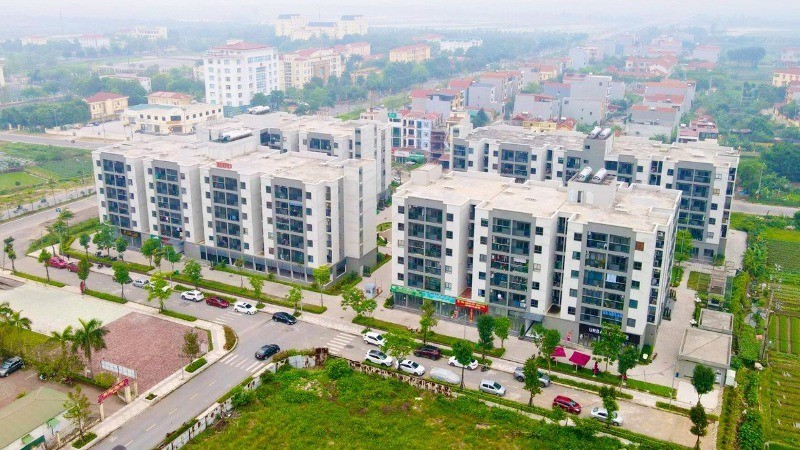
The National Housing Fund is considered a fundamental solution to meet the housing needs of low and middle-income earners. This solution is expected to address the shortage of affordable housing in major cities such as Hanoi and Ho Chi Minh City.
The necessary transformation
Many argue that, in order to develop a new solution with a large scale and significant impact on the housing sector, it is necessary to reassess the results, especially those of the social housing development program implemented over the past 10 years.
Over time, the humanitarian nature of social housing policies has become evident. Many low-income families in urban areas have realized their dream of owning a home thanks to social housing projects. However, implementation has also revealed many limitations, causing the progress to fall short of expectations.
Implementing the Project "Investing in the construction of at least 1 million social housing units for low-income earners and industrial zone workers in the period 2021 - 2030", from 2021 to the present, 655 projects have been implemented nationwide with a scale of 593,428 units. Of these, 103 projects have been completed with a scale of 66,755 units, achieving approximately 15.6% of the Project's target by 2025.
Mr. Nguyen Van Dinh, Chairman of the Vietnam Real Estate Brokers Association, stated: “The social housing development program is a humane policy, but after a long period of implementation, the effectiveness achieved has not been high. Based on practical experience in social housing development, when establishing the National Housing Fund, it is necessary to recognize the experiences and shortcomings in order to avoid and overcome them.”
To date, there is still no financial fund to support localities and businesses in implementing social housing projects. Some projects face obstacles in allocating funds for land clearance, investment in technical and social infrastructure, and interest rate subsidies for loans that do not require collateral. Therefore, the key point of the National Housing Fund is capital. Many experts believe that with this Fund, the role of the State needs to shift from indirect support to direct investment. The current social housing program relies mainly on capital from private enterprises, while the State only indirectly provides preferential support in terms of land, taxes, and credit.
While still encouraging private sector participation, the National Housing Fund needs to shift to a model where the State directly invests in and owns a portion of the housing fund, especially rental housing.
The fund can invest in building social housing projects in convenient areas with integrated infrastructure. These apartments will be sold, rented, or leased at preferential prices, prioritizing low-income individuals and industrial zone workers.
The state budget serves as both "seed capital" and a foundational element, accounting for approximately 20-30% of the Fund's total initial investment capital, used for land compensation and infrastructure investment. It is estimated that achieving the target of 1 million social housing units requires approximately 850,000 billion VND.
In addition, it is necessary to establish a housing savings mechanism in which workers and businesses contribute a portion of their income to a fund. This would allow workers to borrow to buy houses at preferential interest rates over a long period.
The shift in the State's role in implementing the National Housing Fund, from indirect support to direct investment, will help address the shortcomings of the social housing program such as inconsistent infrastructure investment, lack of enthusiasm from businesses, excessively long investment procedures, and difficulties in land acquisition.
In reality, despite being streamlined, the review, assessment, and verification process for social housing projects remains more difficult and complex than that of commercial housing projects. This is because social housing receives significant support from government policies.
During conferences on resolving difficulties and promoting the real estate market, the Ministry of Construction noted many feedback and suggestions from businesses in the social housing development sector. It is estimated that once a social housing project has an approved construction plan, a housing development program and plan, and is included in the local land use list, the time from investment approval to selecting and signing a contract with the investor takes approximately 300 days. A representative from the HUD Corporation stated that, before the relevant laws were amended, the company spent more than three years resolving the procedures for a single social housing project.
We need flexible mechanisms and policies.
At the National Assembly Standing Committee meeting on the afternoon of April 25th regarding the draft Resolution on piloting some specific mechanisms and policies for the development of social housing, for projects not using public investment capital, the Government proposed allowing provincial People's Committees to approve investment policies and designate investors without going through the bidding process. This mechanism is expected to shorten the process by approximately 200 days compared to current regulations.
Explaining the proposal to abolish bidding, Deputy Minister of Construction Nguyen Van Sinh said that the State has already strictly managed profit margins, costs, selling prices, and eligible homebuyers; therefore, bidding does not bring economic or social benefits, but only slows down progress.
According to Mr. Nguyen Van Dinh, the State should play the main role in building the housing fund. The State needs to proactively develop the fund, from establishing planning and creating land reserves to securing capital and procedures. Businesses should participate as contractors. In land clearance, if the State takes the lead in the land acquisition process for projects that serve the community and society, it will receive high levels of consensus from the people whose land is being acquired.
Funding is a core element for the effective operation of the National Housing Fund. Based on Singapore's experience, where up to 80% of the population lives in apartments managed by the Housing Development Council, the secret lies in the combination of government leadership and an efficient financial mechanism.
To raise capital for the National Housing Fund from the financial market, the government could issue national housing bonds modeled after South Korea's. These bonds would need to be guaranteed by the government to increase their attractiveness.
A crucial element for the development of the National Housing Fund is transparent management and prevention of speculation. To avoid losses and misuse, the Fund needs to be operated with a strict management mechanism and independent oversight. Revenue and expenditure activities, capital allocation, and beneficiary lists should be publicly available on an electronic portal; integrated population data should be used to review beneficiary eligibility to ensure transparency and proper targeting. Blockchain technology (a distributed database system operating on a blockchain mechanism) can be applied to track money flows and prevent corruption, profiteering, and speculation.
Source: https://baolaocai.vn/dap-ung-nhu-cau-nha-o-cho-nguoi-thu-nhap-thap-post401769.html










































































































Comment (0)